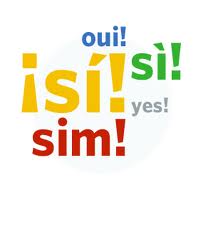hearing beyond the words
 One of the most difficult aspects of any mediation is helping the parties listen and understand what the other party is really saying. Many times it is hearing beyond the words, comprehending the underlying message that the other person is really trying to send but which they may not always be able to express directly.
One of the most difficult aspects of any mediation is helping the parties listen and understand what the other party is really saying. Many times it is hearing beyond the words, comprehending the underlying message that the other person is really trying to send but which they may not always be able to express directly.
Lack of communication is difficult enough when people are at odds with each other. It is even more difficult when the parties are from different cultures and were raised in different languages.Having grown up fully immersed in French, Spanish and English and having lived in countries where natives spoke those languages, I can easily think, converse, read and write in all three, and even shift from one to another within the same sentence, let alone the same conversation.

After my present husband of 21 years, (who was as he says, born and bred in New York, NY) and I were first married, and he moved in with me and my young children, he used to say amusingly to his friends, that around the dinner table he felt like he was at a doubles’ tennis match; he never knew who was going to say what in what language, and often struggled to keep afloat in this lively pool of conversation. Sentences would invariably start in English and end in French, sometimes even with a Spanish word thrown in here and there. No one was being rude or trying to keep him out; it was unconscious and natural to us to converse this way, but he could not “hear” what we were saying.
I have to admit that this ability to shift has given me big advantages (set aside the fact that of course I am not being grammatically correct!), not only working with multi cultural families, either in their language or in English, but also working with English speaking US citizens. I really listen to what they are saying, and try to be extremely open and alert, recognizing that everyone comes from His or Her own place and sees things in a different way.
French, Spanish and South Americans, and North Americans often have different perspectives on what is done and not done. If you have followed two recent publications written by a Chinese mother and a French mother on how they raise their children, you can certainly note the big differences and how what seems OK to a French parent or a Chinese parent may not be OK to a parent from the US.

Here is an example of one cultural difference I see. At dinner parties when seating arrangements are made, Americans will usually sit couples next to each other, while in France, couples are always separated. I once worked with a couple, he, American, and she, French. He was always furious when they went to “French dinners” in New York because his wife was seated next to two other men! French feel that at a dinner party you should never sit with your spouse whom you see all the time; it makes for a more interesting evening to meet new people. This couple had many fights because of the misunderstandings around their cultural differences, and each of them continued to stand firm in their positions. All of their differences both cultural and otherwise were carried right into the mediation room even while negotiating their divorce!
Differences may not be so simple when working with couples of the same culture going through a divorce. Occasionally I find out that by asking a few more questions and trying to understand what they have on their minds, they are actually “saying” the same thing but expressing it in a different “language” which, of course, contributes to the tension between them. 
Whether you are working on staying married or working on getting a divorce, keep an open mind and be willing to sit sometimes in the other person’s chair so that you can view the situation from their perspective.
Mediation can help you hear and therefore better understand what the other party really has to say and where they are coming from. And really “hearing” will serve you better in working out your disagreements.
By:
Jennifer Safian
Family and Divorce Mediator
1000 Park Avenue at 84th st.
New York, NY 10028
212 472 8626
[email protected]